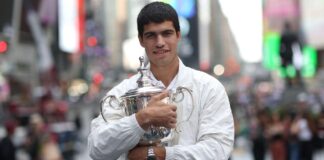Professional footballer Karl Nessib has announced his homosexuality – as the first active football player in the United States. He does not like to talk about private matters, but he hopes that one day such videos will not be necessary.
For professional athletes like him, it’s still hard to break out, says sports sociologist Birgit Braummuller. This is also due to sports.
SRF News: What do you think of Karl Nessib’s exit?
Birgit Brumöller: I think it’s a very brave and wonderful move. I think this has a great modeling effect, because it comes from a classic male sport, American football, which is very popular in the United States.
What role does the role model play in the matter?
We’ve made it happen. We’ve asked LGBT people across Europe (lesbian, gay, bisexual, and transgender/intersex, editor’s note) what they would like to see in the fight against LGBT people. The point at the top of the list was that famous athletes go out in public in order to create something like this.
Why is it so special to come out as a sports professional?
Sports remains a social sphere that is strongly shaped by heterosexual ideas and gender stereotypes. It seems logical to us that the typical athlete is male and straight. This is why publications like Nassib are still worth publishing.
The media, fans, and the public interest that the sport receives also play a major role.
In addition, sports have masculine characteristics. Gays are likely to be denied these. Which, of course, does not correspond to reality, but only reflects our heterogeneous ideas and expectations. In addition, the media, fans and in general the interest in sports plays a major role. All of this can make it difficult for a person to quit certain sports.
What role does sport play in how difficult it is to get out?
It plays a central role. For men, there is still a sport in which homosexuality is strictly taboo. Experience has shown that this primarily includes team sports. Above all, the reasons are given the emotional and physical closeness of the players and social solidarity.
What can clubs do to normalize going abroad?
Our study showed that lack of knowledge and unwillingness to perceive are the biggest problems. Therefore, the central recommendation of the work is to raise awareness of all actors.
Each of us can strive for equal participation in sport.
We asked sports clubs for best practices. It turns out that there must be people who take over the topic and push it forward. LGBT people should also be included in the decision-making process. On a structural level, it will be important to embed an appreciation of diversity, anti-discrimination and all dimensions of sexual orientation in laws.
What does that mean in practice, for example in the field?
It is very important to provide trainers with tools on how to deal with issues of gender and sexual diversity. This should be implemented in training structures. And last but not least, we are all asked to a certain extent: everyone can advocate equal participation. For example, by not accepting homosexual negative language and allying with homosexuals in order to show that sport is tolerant and that everyone is welcome.
Interviewed by Sandra Whitmer.









